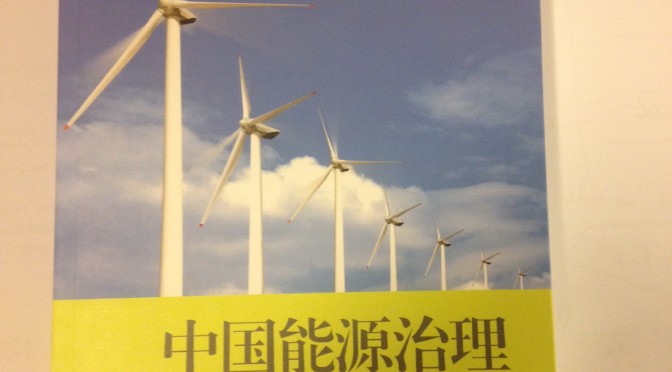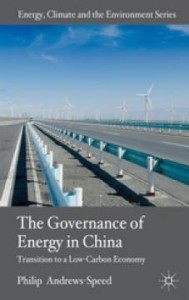 The Governance of Energy in China. Transition to a Low Carbon Economy
The Governance of Energy in China. Transition to a Low Carbon Economy
My book which was originally published by Palgrave Macmillan in 2012 has now been published in Chinese by the China Economic Publishing House, and is available for RMB 68 (about GBP 7).
What might the G20 under China’s Presidency deliver for global energy governance?
Philip Andrews-Speed and Xunpeng Shi
Synopsis
The prevailing architecture of global energy governance is fragmented, uncoordinated and, failing to yield the required outcomes. This brief examines the argument that the G20 can provide a leadership role to improve the quality of global energy governance. Given that …
Continue Reading ››
 The Global Resource Nexus and the Struggle for Land, Energy, Food, Water and Minerals
The Global Resource Nexus and the Struggle for Land, Energy, Food, Water and Minerals
By Philip Andrews-Speed, Raimund Bleischwitz, Tim Boersma, Corey Johnson,Geoffrey Kemp, Stacy D. VanDeveer
In addition to environmental change, the structure and trends of global politics and the economy are also changing … Continue Reading ››

Philip worked with the World Bank Institute (WBI) and with Oil, Gas and Energy Law (OGEL) to convene a Learning Symposium on the Governance of Unconventional Gas, held in Washington D.C., 2-3 June 2014
Background
The “shale gas revolution” in the US has led to an explosion of interest around …
Continue Reading ››

China is both the largest emitter of greenhouse gases in the world and the country with the greatest challenge to constrain the level of its emissions. The way in which energy is governed in China is an important factor driving its rising level of carbon dioxide emissions. …
Continue Reading ››
International energy and resources policy, with a focus on China
 The Governance of Energy in China. Transition to a Low Carbon Economy
My book which was originally published by Palgrave Macmillan in 2012 has now been published in Chinese by the China Economic Publishing House, and is available for RMB 68 (about GBP 7).
The Governance of Energy in China. Transition to a Low Carbon Economy
My book which was originally published by Palgrave Macmillan in 2012 has now been published in Chinese by the China Economic Publishing House, and is available for RMB 68 (about GBP 7).  The Governance of Energy in China. Transition to a Low Carbon Economy
My book which was originally published by Palgrave Macmillan in 2012 has now been published in Chinese by the China Economic Publishing House, and is available for RMB 68 (about GBP 7).
The Governance of Energy in China. Transition to a Low Carbon Economy
My book which was originally published by Palgrave Macmillan in 2012 has now been published in Chinese by the China Economic Publishing House, and is available for RMB 68 (about GBP 7). 

 Philip worked with the World Bank Institute (WBI) and with Oil, Gas and Energy Law (OGEL) to convene a Learning Symposium on the Governance of Unconventional Gas, held in Washington D.C., 2-3 June 2014
Philip worked with the World Bank Institute (WBI) and with Oil, Gas and Energy Law (OGEL) to convene a Learning Symposium on the Governance of Unconventional Gas, held in Washington D.C., 2-3 June 2014
